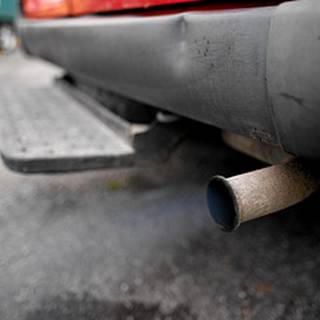
Welcome to the ezine produced by SGI Buddhists that prompts the positive, kindles the constructive, highlights the hopeful and leaves you feeling - well, up!

 Is it time for Lady Penelope to give up her gas guzzler?
Is it time for Lady Penelope to give up her gas guzzler?
By Louis Reynolds
There is a silent, ongoing, global war between motor cars and people. It is silent because, though it kills many times more people than armed conflicts and terrorist acts combined, it seldom hits the headlines in the way they do. It is ongoing because it rages and will continue to rage around us day and night. And it is global because, though it started in the rich world just over a century ago, it has spread throughout the world and is now spreading like wildfire through poor countries.
I have called this war Carmageddon, from Armageddon (n), a dramatic and catastrophic conflict, especially one seen as likely to destroy the world or the human race. This article describes Carmageddon and its four theatres of war.
Theatres of War
The first, Motorcarnage, the daily killing on the roads, is the one we are most aware of. The second is Oil Wars: large and small armed conflicts in pursuit of the world's remaining oil reserves. Third, there is Global Ecocide, the part played by cars in climate change and global warming, probably the most serious threat to human life in history. Finally, there is Social Ecocide, the degradation of communal life and culture brought about by our dependency on cars to move around.
Motorcarnage
The killing comes vaguely into our sub-consciousness in the daily 'traffic report' we hear on the radio, which tells us where to expect delays or which alternative routes we can use when there has been a violent incident involving motor vehicles: 'There has been a collision on the N1 near Bellville, expect some delays, or take an alternative route through so-and-so…' It seldom mentions the victims.
Deaths due to motor vehicles exceed those due to armed conflict several-fold. Annual traffic deaths number more than 1.2 million and those due to armed conflict around
Most of those killed and maimed by Motorcarnage do not belong to the car-owning classes. Militarists would see these deaths as 'collateral damage'. Overwhelmingly they are from poor countries, or poor communities within rich countries. In 2002, 96% of all children killed were from low-income and middle-income countries. In rich countries the risk for children in families without a car is twice that of children in car-owning families.
Motoring journalists often refer to motor cars as weapons. Motor journalist Dennis Droppa says the BMW 5M is 'more than just a cruise missile'. It has 'the ammo to take on the supercharged E-55 even though the Benz outguns it.' His colleague, Michelle Lupini agrees: 'I reckon the BMW 5M has to be the ultimate driving weapon on the road today.' And these are not the only cars praised in the language of the arms trade.
Oil Wars
Examples of Oil Wars include the illegal invasion and occupation of
We can expect oil wars to escalate for three reasons. Firstly, the world’s oil production is predicted to peak soon (if it hasn’t already). Secondly, demand will continue to increase, particularly in the light of rapid economic growth and the accelerated motorisation of new superpowers like
Global Ecocide
Cars are one of the largest contributors to carbon dioxide and other emissions from combustion of oil so they play a large role in the process of climate change.
 Climate change already kills an estimated 160,000 people each year but the future looks even more threatening. Once again it will be the poor, the people who don't belong to the car-owning classes, who will suffer the most.
Climate change already kills an estimated 160,000 people each year but the future looks even more threatening. Once again it will be the poor, the people who don't belong to the car-owning classes, who will suffer the most.
The Intergovernmental Panel on Climate Change (IPCC) is the foremost authority in this field. IPCC models show that climate change will threaten health 'particularly in lower income populations, predominantly within tropical/subtropical countries'. They confidently predict that climate change will result in an increase in heat-related death and illness, lead to more epidemics of infectious diseases after storms and floods, and make significant impacts from the displacement of populations in response to rises in sea level and greater storm activity.
Overall crop yields are predicted to decrease as temperatures rise. Food prices will increase globally, and vulnerable populations will become hungrier. Though some places may see an overall increase in rainfall, drier parts of the world are likely to become drier with climate change.
And if anyone is still doubtful about the evidence, the Royal Society has produced an excellent on-line document debunking the 'controversies' surrounding climate change.
Social Ecocide
The motor car's war against communal life and culture is perhaps the most subtle and pervasive theatre of the war. Cars have changed our perception of place, space and time, as well as our relationships with others. It is not possible to explore this fully here.
Fundamentally, the motor car is a vehicle of inequality. To understand this, ask yourself three questions:
(1) Do you claim the right to drive a private car freely and within the traffic laws and regulations?
(2) Do you grant the same right to everyone else over the age of 18 who is competent to drive?
(3) Would you be prepared to live in a world where everyone exercised this right?
Bear in mind that while 'developed' countries such as the
Our dependency on cars stems from the myth that the motor car promotes our rights to personal mobility and freedom. As counter-intuitive as this may seem, it is very far from the truth.
The problem with cars is that, no matter how 'green' they become with new technology, their level of usefulness decreases as more people use them. If everyone owned one, they would be useless. Thus, inevitably, they can only give mobility to a minority. And, since private car ownership leads to increasing commuting distances even for those who do not own them, car-less people are sentenced to immobility (unless public transport is good).
In direct contrast to the car, bicycles would remain useful even if everyone owned one, and the world would be a better place. No matter how elegant and high tech, the motor car is a crude, dirty, dangerous and wasteful form of transport.
Ivan Illich pointed out that 'beyond a critical speed, no one can save time without forcing another to lose it.' Speeds above what we can achieve with our muscles – i.e. of the order of bicycle speeds – are fundamentally inequitable. The only way to change this is to limit personal transport to bicycle speeds.
Finally: Put people before cars
The motor car is both a symbol of, and a metaphor for, the kind of industrialisation and economic growth that favours the rich, needs massive amounts of energy, produces massive amounts of waste, and is fundamentally unsustainable. The motor car cannot take us down the road to equity and social justice. Instead, it is taking the world down a one-way road to destruction.
We must pursue economic and growth policies that put people first, where work and leisure areas are within the community, close together, where children can explore their environment safely. We should promote small local business and industry, and base our transport policies on walking, bicycles and good public transport.
It won't be easy. There are massive vested interests around this issue, including the car industry, big oil, the road industry, and so on. But probably the biggest obstacle is ourselves and our addiction to the motor car.
From Critical Health Perspectives 2006 No. 3 - PHM
Do you agree? Leave a comment here or add to the thread in the Forum section

